Namibian Army
The Namibian Army is the ground warfare branch of the Namibian Defence Force.
| Namibian Army | |
|---|---|
 Emblem of the Namibian Army | |
| Founded | 3 September 1990 |
| Country | |
| Allegiance | Constitution of Namibia |
| Type | Army |
| Part of | Namibian Defence Force |
| Garrison/HQ | Grootfontein, Otjozondjupa Region, Namibia |
| Anniversaries | 3 September 1990[1] |
| Engagements | Caprivi Conflict Second Congo War United Nations Mission in Liberia |
| Commanders | |
| Commander In Chief | President Hage Geingob |
| Minister of Defence | Peter Vilho |
| Army Commander | Major-General Matheus Alueendo[2] |
History
Development of Namibia's army was fastest of the three arms of Service. The first units of the Army were deployed as early as 1990. The Army was formed when two enemies South West African Territorial Force and the People's Liberation Army of Namibia where inducted after Namibia's independence into the newly created Namibian Defence Force.
Role
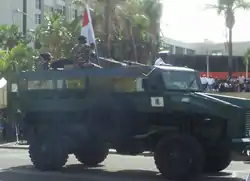
The Ministry of Defence has outlined the Army policy as follows:
"The Army's principal roles will continue to be as already outlined in the defence policy. The Army will strive to maximise its operational effectiveness through the recruitment of the best young men and women who wish to pursue a military career, their effective training and employment. The Army's equipment priorities are improved troop-lift capacity (road and air); engineer, artillery, anti-tank and air defence and communication systems: the aim being to create a secure, integrated, efficient and cost-effective systems." "The Army will remain a well-disciplined and accountable, professional (all volunteer) force; it will include development of a Reserve; it will continue to train along the lines of other Commonwealth armies; it will train with other Namibian forces (such as the police) to rehearse plans for aid to the civil authorities, civil ministries and civil community; and it will promote a good public image and contribute to the communities in which it is based."[3]
Organisation
The Army is a hierarchical organisation with the Army commander exercising overall command. The Army headquarters are located at Grootfontein military base,a former SADF logistics base. The Army has several thousand members. Senior Army officers also dominate staff positions at Defence Headquarters
Deployments

Local deployments
See also: Caprivi Conflict
The Namibian Army had a convoy service on Namibia's Trans Caprivi Highway which runs from Otavi, Grootfontein, Rundu, Katima Mulilo until Ngoma border post on the Namibia and Botswana border. The convoy system ran twice daily between Bagani and Kongola in the then Caprivi region. The convoy system was run from the year 2000 till 2002.[4]
SADC deployments
Angola
The Namibian Army also deployed troops to help fight UNITA insurgents active in and around the Kavango region. The operation codenamed Mandume ya Ndemufayo was a response to UNITA attacks on Namibian citizens. The Namibian cross border pursuit operations were carried out with consent of the Angolan government.[5] At least two soldiers were killed in operation Mandume ya Ndemufayo.[6] In an operation between 30 January 2001 to 14 February 2001 an estimated 19 UNITA rebels were killed while various weaponry such as Anti Tank and Anti personnel landmines assault rifle ranging from AK-47 and R-1 rifles were recovered.[7] In a joint operation with the Angolan Armed Forces, the Namibian Defence Force in May 2001 helped dislodge UNITA from Mavinga in May 2001.[8]
Democratic Republic of the Congo
The Namibian Army deployed a reinforced battalion during the Second Congo War that numbered about 2000 troops and support personnel. About 30 Namibian Serviceman died in the DRC operations.[9] The Operation was Code named Atlantic . The SADC coalition force commander was always a Zimbabwean and deputy force commander a Namibian while the Chief of Staff was an Angolan.[10] 11 Namibian soldiers were held as prisoners of war in Rwanda, they were released in June 2000.[11] The soldiers were captured in April 1999 in the Lusambo area which is about 120 kilometers east of Mbuji-Mayi.[12] In January 2001 after Laurent-Désiré Kabila's death the Namibian army contingent was reinforced to not only provide security to Heads of States at the funeral but also to reinforce the SADC contingents in Kinshasa and Lubumbashi.[13] Namibia was also the first foreign country to withdraw its troops and by September 2001 all Namibian soldiers had been withdrawn.[14] Seven soldiers who have been missing in action have since been declared dead. The seven had gone missing around the Deya River close to Kabalo, Deya-Katutu and Lusambo areas.[15]
UN deployments
- UNAMIC - The army deployed a Company sized unit to UNAMIC.[1]
- United Nations Angola Verification Mission III (UNAVEM III)
- MONUA
- United Nations Mission in Liberia (UNMIL)
For the peacekeeping operation in Liberia the Namibian Army contribution was known as Namibian Battalion (NAMBATT) and about 800 infantry troops per NAMBATT contingent were mustered to form a battalion for this operation. Troops were rotated and rotations numbered up to NAMBATT V. A NAMBATT contingent commanding officer stated his unit was to comprise "two Mot Inf Coys, two rifle companies, headquarters company and fire support company while the battalion is equipped with 10 Wolf APC's, 12 Casspir APC's and 11 WER Wolf APC's".[16]
Unit structure
The standard operational units are structured according to the British commonwealth system:[17]
| Type of unit | Division | Brigade | Battalion / Regiment | Company / Squadron | Platoon / Troop | Section | Fire Team |
|---|---|---|---|---|---|---|---|
| Contains | 2–3 Brigades | 3–5 Battalions | 5–7 Companies | 3 Platoons | 3 Sections | 2 Fire Teams | 4 Individuals |
| Personnel | 10,000 | 5,000 | 550–900 | 120 | 30 | 8–10 | 4 |
| Commanded by | Maj-Gen | Brig-Gen | Lt Col | Maj | Capt, Lt or 2nd Lt | Cpl | LCpl |
Units
Air Defence Corps
Artillery Corps
Infantry Corps
Based in Windhoek
- 12 Motorised Infantry Brigade[22]
- 124 Battalion
- 125 Battalion
Based at Walvis Bay[23]
- 126 Battalion
- 26 Motorised Infantry Brigade.[25]
- 261 Motorized Infantry Battalion[26]
Based in Rundu.The Commanding Officer is Lt Col Liyali Given Numwa who succeeded Lt Col David Diyeve.[25]
- 262 Motorized Infantry Battalion
Based in Katima Mulilo. Presivous Commanding officers includes Erastus Kashopola
- 263 Motorized Infantry Battalion
Based at Oshakati[27] The current Commanding Officer is Lt Col Wesley Muruko. Previous Commanding Officers included Erastus Kashopola and Colonel Abed Mukumangeni.
Engineer Corps
- Engineer Regiment
Logistics Formation
- Logistics Support Battalion[28]
Provost Corps
- Military Police Battalion
Recce Formation
- Recce Regiment[29]
Signals Corps
- Signal Regiment
Training Corps
- Army Battle School Oshivelo
Based at the former Oshivelo SADF training base has been transformed into an army battle school. The commandant of the battle school is Colonel H. Mvula who succeeded Colonel Joel Kapala [30] as-off 6 January 2015,Colonel Kapala succeed Colonel Kashindi Eusebi Kashindi.[31]
- Technical Training Centre (TTC)[32]
The Army TTC offers training to army soldiers covering mechanics and electrical configurations of armaments,military weapons and equipment[33]
- School of Artillery
Based at the Oluno Military Base, the school is responsible for the training requirement of all soldiers specializing to become artillery gunners.[34] Lt Col Ambrosius Kwedhi is the Commandant of the School.
Command Structure
Army commander
The position of Army commander is held by a commissioned officer with the rank of major general. The Army Commander exercises the overall command of the Army. The current Army commander is Major General Matheus Alueendo.
- 1990-2000 Maj-Gen Solomon Huwala
- 2000-2005 Maj-Gen Martin Shalli
- 2005-2011 Maj-Gen Peter Nambundunga
- 2011-2013 Maj-Gen John Mutwa
- 2013-2017 Maj-Gen Tomas Hamunyela
- 2017-2019 Maj-Gen Nestor Shali Shalauda
- 2019-present Maj-Gen Matheus Alueendo
Senior Appointments
| Sleeve insignia | Appointment | Rank and Name |
|---|---|---|
| Army Commander | Major General Matheus Alueendo | |
| Deputy Army Commander | Brigadier General | |
| General Officer Commanding 21 Motorised Infantry Brigade | Brigadier General Martin Nangolo Shikomba | |
| General Officer Commanding 12 Motorised Infantry Brigade | Brigadier General Aktofel Nambahu | |
| General Officer Commanding 26 Motorised Infantry Brigade | Brigadier General Willem Shigwedha | |
| General Officer Commanding 4 Artillery Brigade | Brigadier General Ambrosius Kwedhi | |
| General Officer Commanding Air Defence Brigade | Brigadier General Lazarus Herman | |
| Commanding Officer Signal Regiment | Colonel | |
| Commanding Officer Engineer Regiment | Colonel | |
| Commanding Officer Recce Regiment | Colonel | |
| Commandant Army Battle School | Colonel H Mvula | |
| Army Sergeant Major |
Army equipment
Individual weapons
| Origin | Type | Notes | |
|---|---|---|---|
| AK-47[35] | Assault rifle | Likely captured by South West Africa Territorial Force | |
| Type 56[36] | Assault rifle | Chinese variant of Soviet AK-47 | |
| INSAS[37] | Assault rifle | Used by Namibian UN peacekeeping forces | |
| AK-74[38] | Assault rifle | ||
| M4[39] | Assault rifle | ||
| RPG-7[40] | Anti-tank rocket propelled grenade launcher | Likely captured by South West Africa Territorial Force | |
| M2 Browning | Heavy machine gun | Likely inherited from South West Africa Territorial Force | |
| Makarov | semi-auto pistol | ||
| Ruger P series | Semi-auto pistol | ||
| CZ 75 | Semi-auto pistol | ||
| 9M133 Kornet | Anti-tank guide missile system |
Vehicles
Vehicles of the Namibian Army are made up of a variety of suppliers including those from the former Soviet Union, Russia, Brazil, & South Africa. Some vehicles were donated by SWAPO, formerly a liberation movement which later became the ruling party of the country at independence, and SWATF, the security force of the then South West Africa administration. The army has received WZ523 Infantry Fighting Vehicles from China which serve with mechanized infantry units. These vehicles are supplemented by the Namibian made Wolf series of MRAPs. South African made Casspirs are also in service which were inherited from the South-West Africa Territorial Force. To enhance mobility it was announced that the Army will receive the Agrale Marruá which appeared at the 25th Independence celebration parade in 2015 and are primarily used by the Namibian Special Forces.[41]
| Name | Image | Origin | Type | Acquired | In service | Notes |
|---|---|---|---|---|---|---|
| T-54/55 | Main battle tank | 20[42] | 7[43] | Serviceability doubtful.[44] | ||
| BTR-60 | Armoured personnel carrier | 10[44] | Serviceability doubtful | |||
| BTR-152 | Armoured personnel carrier | 20[40] | 6[44] | Formerly SWAPO;[40] serviceability doubtful | ||
| WZ523 | 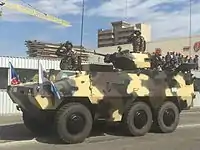 |
Infantry fighting vehicle | 21[45] | Armed with 2A28 Grom.[46] | ||
| WZ523-Type-05 | Infantry fighting vehicle | 10[45] | ||||
| Wer’wolf MKII | 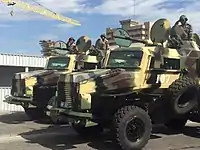 |
Multipurpose armoured vehicle | 10[40] | 30[43] | ||
| Wolf Turbo II | Armoured personnel carrier | |||||
| Toofan (infantry mobility vehicle) | MRAP | |||||
| Casspir |  |
MRAP | 20[43] | 20[47] | ||
| BRDM-2 | Scout car | 12[44] | 12[47] | Serviceability doubtful | ||
| SAMIL | .jpg.webp) |
Utility vehicle | 160[9] | Donated by South Africa in the late 1990s. | ||
| Ural Trucks |  |
Utility vehicle | 183[48] | Delivered in October 2015. | ||
| Agrale Marruá | 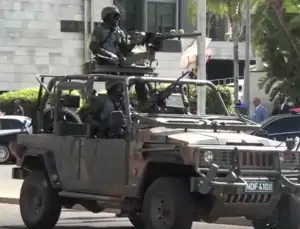 |
Utility vehicle | 141 | - | Being assembled locally.[41] | |
| Toyota Hilux |  |
Utility vehicle | - | |||
| Toyota Land Cruiser | Utility vehicle | - | ||||
Artillery
Artillery is also dominated by Soviet-era weapons, also donated by SWAPO. They have been supplemented by 24 G2 artillery donated by South Africa.[49]
| Name | Image | Origin | Type | Acquired | In service | Notes |
|---|---|---|---|---|---|---|
| BL 5.5 | 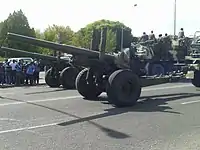 |
Howitzer | 24[45] | South African variant G2. | ||
| Ordnance QF 25 pounder | Howitzer | 8[43] | ||||
| 152 mm howitzer-gun M1937 (ML-20) | Howitzer | |||||
| BM-21 Grad | Multiple rocket launcher | 5[43] | 4[44] | |||
| ZIS-3 | Antitank gun | 12[44] | ||||
| ZIS-2 | Antitank gun | 6[40] | ||||
Anti aircraft weapons
Air defence equipment of the Army is also made up of Soviet-era weaponry.
| Origin | Type | Acquired | In service | Notes | |
|---|---|---|---|---|---|
| ZPU-4 | Anti-aircraft gun | 50[44] | |||
| 37 mm automatic air defense gun M1939 (61-K) | Anti-aircraft gun | ||||
| ZU-23-2 | Anti-aircraft gun | 15[43] | 12[44] | ||
| 9K32 Strela-2 | MANPAD | ||||
Special Forces
The Army commandos and airborne paratroopers are part of the Namibian Special Forces.
Ranks and insignia
Army ranks are based on Commonwealth ranks. The highest rank in peace time a commissioned officer can attain in the army is major general. There may, however, be an exception when an army officer is appointed as Chief of the Defence Force, for which the individual will ascend to the lieutenant general. The highest rank an enlisted member can attain is warrant officer class 1.
Officers
| Equivalent NATO Code | OF-10 | OF-9 | OF-8 | OF-7 | OF-6 | OF-5 | OF-4 | OF-3 | OF-2 | OF-1 | OF(D) & Student officer | |||||||||||||||||||||||||
|---|---|---|---|---|---|---|---|---|---|---|---|---|---|---|---|---|---|---|---|---|---|---|---|---|---|---|---|---|---|---|---|---|---|---|---|---|
| No equivalent |  |
 |
 |
 |
 |
 |
 |
 |
 |
 |
Unknown | |||||||||||||||||||||||||
| General | Lieutenant General | Major General | Brigadier | Colonel | Lieutenant Colonel | Major | Captain | Lieutenant | 2nd lieutenant | |||||||||||||||||||||||||||
Enlisted
The highest rank an enlisted member can attain is warrant officer class 1.
| Non Commissioned officer rank structure of the Namibian Army | |||||
|---|---|---|---|---|---|
| Warrant officer class 1 | Warrant officer class 2 | Staff sergeant | Sergeant | ||
 |
 |
 |
 | ||
| WO1 | WO2 | SSGT | SGT | ||
| Corporal | Lance corporal | Private |
|---|---|---|
 |
 |
No insignia |
| CPL | LCPL | PVT |
Citations
- "Archived copy" (PDF). Archived from the original (PDF) on 2 July 2015. Retrieved 28 June 2015.CS1 maint: archived copy as title (link)
- "Archived copy". Archived from the original on 11 December 2017. Retrieved 10 December 2017.CS1 maint: archived copy as title (link)
- "Ministry of Defence". Archived from the original on 25 January 2017.
- "Convoy system suspended in Caprivi". IRIN. 17 June 2002. Archived from the original on 20 November 2015. Retrieved 13 July 2017.
- "Namibian troops pursue bandits in southern Angola". IRIN. 23 May 2001. Archived from the original on 20 November 2015. Retrieved 13 July 2017.
- "Defence ministry admits to deaths against UNITA". IRIN. 6 August 2001. Archived from the original on 20 November 2015. Retrieved 13 July 2017.
- "NDF hails Angolan operations as a success". IRIN. 21 February 2001. Archived from the original on 20 November 2015. Retrieved 13 July 2017.
- "NDF claims major victory against UNITA". IRIN. 17 May 2001. Archived from the original on 20 November 2015. Retrieved 13 July 2017.
- "Troops home from DRC". IRIN. 4 September 2001. Archived from the original on 20 November 2015. Retrieved 13 July 2017.
- "NDF captives may be released on Friday". IRIN. 16 June 2000. Archived from the original on 20 November 2015. Retrieved 13 July 2017.
- "ICRC visits NDF prisoners". IRIN. 30 September 1999. Archived from the original on 20 November 2015. Retrieved 13 July 2017.
- "More troops sent to DRC". IRIN. 25 January 2001. Archived from the original on 20 November 2015. Retrieved 13 July 2017.
- "Namibia to withdraw all troops by end of August". IRIN. 13 July 2001. Archived from the original on 20 November 2015. Retrieved 13 July 2017.
- Newspaper, The Namibian. "Seven soldiers missing in DRC declared dead". www.namibian.com.na. Archived from the original on 27 April 2016. Retrieved 13 July 2017.
- "UN Mission In Liberia Decorates Namibian Peacekeepers". Archived from the original on 30 January 2013. Retrieved 23 January 2014.
- "British Army Formation & Structure". WhoDaresWins.com. 2011. Archived from the original on 29 April 2011. Retrieved 15 April 2011.
- Tomas, M (July 2011). "Inauguration of 21 Inf Bde Commander". NDF Journal. 41: 4.
- http://www.mod.gov.na/pdfs/oct-dec%202013.pdf%5B%5D
- "Archived copy". Archived from the original on 21 September 2016. Retrieved 7 March 2016.CS1 maint: archived copy as title (link)
- "Trigger-happy soldier in court". New Era Newspaper Namibia. 22 July 2014. Archived from the original on 4 March 2016. Retrieved 13 July 2017.
- Dumeni, R (September 2011). "12 Mot int Bde Hosted computer course for trainers". NDF Journal. 49: 7.
- "NDF Majors rapped over illegal use of truck | Informante". www.informante.web.na. Archived from the original on 20 November 2015. Retrieved 13 July 2017.
- Tomas, M (December 2013). "Mighty Scorpions Sport tournament". NDF Journal. 46: 10.
- Tomas, M (December 2014). "Maj Numwa takes over 261 Mot Inf Bn reign". NDF Journal. 54: 16.
- loop (30 August 2007). "US Assists NDF Training". New Era Newspaper Namibia. Archived from the original on 20 November 2015. Retrieved 13 July 2017.
- "Pandeni given a hero's farewell". The Namibian. Archived from the original on 19 November 2015. Retrieved 13 July 2017.
- "Civil supremacy of the military | Namibia". www.namibweb.com. Archived from the original on 28 June 2016. Retrieved 13 July 2017.
- www.omalaetiit.com, Omalaeti Technologies, Namibia. "Third Defence Force Foundation annual sport tourney concludes". Archived from the original on 12 February 2017. Retrieved 13 July 2017.
- "Archived copy". Archived from the original on 7 April 2016. Retrieved 26 March 2016.CS1 maint: archived copy as title (link)
- Shino, G (December 2013). "Army Battle School Commandant retires". NDF Journal. 46: 10.
- "Army training centres open at Grootfontein". The Namibian. Archived from the original on 18 August 2016. Retrieved 13 July 2017.
- www.omalaetiit.com, Omalaeti Technologies, Namibia. "Army and Airforce Technical Training Centres open at Grootfontei". Archived from the original on 6 August 2016. Retrieved 13 July 2017.
- Namibian Broadcasting Corporation (31 July 2016), Artillery School-NBC, archived from the original on 18 August 2017, retrieved 13 July 2017
- Menges, Werner (18 December 2002). "Namibia: Soldier Claims Ignorance About AK-47 Used to Murder Farmer". The Namibian (Windhoek). Archived from the original on 1 January 2003. Retrieved 13 July 2017.
- Elena Torreguitar. National Liberation Movements in Office: Forging Democracy with African Adjectives in Namibia (2009 ed.). Peter Lang GMBH. p. 159. ISBN 978-3-631-57995-4.
- Iikela, Sakeus (8 May 2019). "Defence suspends 'military exercises'". The Namibian.
- "SALW Guide - Country Detail - Namibia". Archived from the original on 7 April 2014.
- "NAMPA: WHK NDF parade 20 March 2015 hd". Youtube. Archived from the original on 18 August 2016. Retrieved 6 February 2016.
- Copley, Gregory. Defense & Foreign Affairs Handbook 1994. p. 1207.
- Martin, Guy. "Namibia Defence Force orders Marrua vehicles | defenceWeb". www.defenceweb.co.za. Archived from the original on 5 January 2015. Retrieved 13 July 2017.
- "Армии стран мира : Вооруженные силы иностранных государств на 2001 год : N". Archived from the original on 29 March 2014. Retrieved 3 April 2014.
- "Scramble for the Congo - Anatomy of an Ugly War" (PDF). ICG Africa. 20 December 2000. Archived from the original (PDF) on 29 October 2013. Retrieved 18 June 2013.
- Guy Martin. "Namibia Defence Force". Archived from the original on 27 February 2014. Retrieved 3 April 2014.
- "Trade Registers". Armstrade.sipri.org. Archived from the original on 14 April 2010. Retrieved 20 June 2013.
- "Namiba fields a new Chinese APCs". Archived from the original on 31 October 2014.
- Hussein Solomon. Towards a Common Defence And Security Policy in the Southern African Development Community (2004 ed.). Africa Institute of South Africa. p. 91. ISBN 978-0798301749.
- https://www.namibiansun.com/news/army-tight-lipped-about-russian-trucks
- Leon Engelbrecht. "South African Arms Exports". Archived from the original on 22 January 2016. Retrieved 26 November 2015.